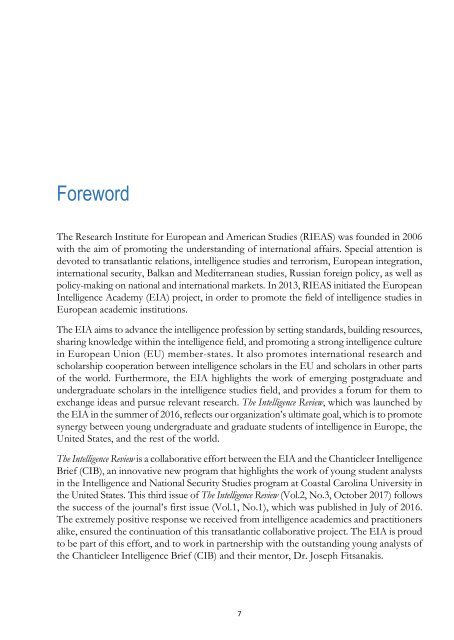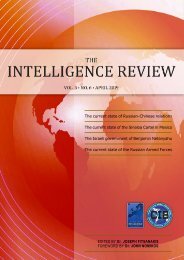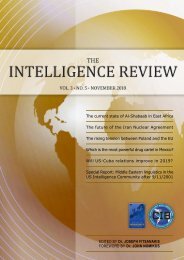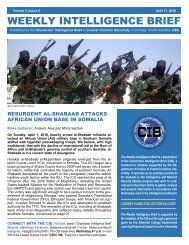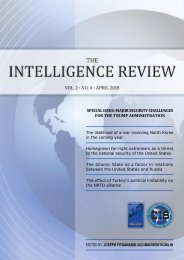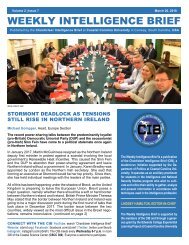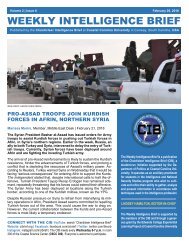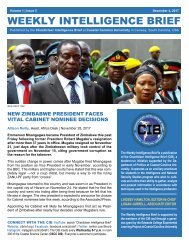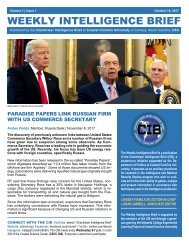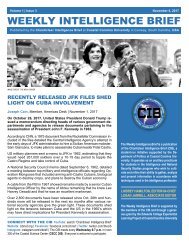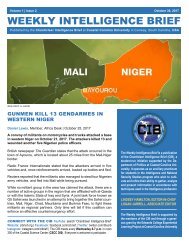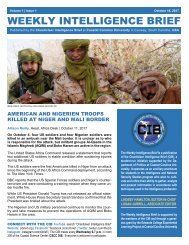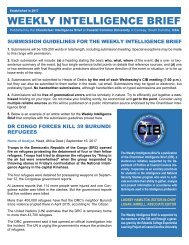The Intelligence Review | volume 2 | issue 3 |
This volume is the product of a collaboration between the European Intelligence Academy (EIA) and the Chanticleer Intelligence Brief (CIB), a student-run initiative supported by the Department of Politics at Coastal Carolina University in Conway, South Carolina, United States. Eight CIB analysts tackle some of the most pressing and timely questions confronting intelligence observers today. Topics in this volume include the current and projected strength of the Islamic State in Libya, the status of unification efforts on the island of Cyprus, the future of the government in Venezuela, and the United States’ place in the Paris climate agreement. There are also papers examining the construction of energy pipelines in Central Asia, as well as aspects of Iranian geopolitics in relation to the United States. Last, though certainly not least, we have included an estimative intelligence analysis of the first round of this year’s presidential elections in France. It refers to an event of global significance that has already taken place. However, it is included in this volume as an illustration of the power of intellectual accuracy and the ability of an intelligence analyst to achieve 100 percent accuracy —as this analyst does— by methodically considering and evaluating the analytical parameters of her question with the right balance of precision and intuition.
This volume is the product of a collaboration between the European Intelligence Academy (EIA) and the Chanticleer Intelligence Brief (CIB), a student-run initiative supported by the Department of Politics at Coastal Carolina University in Conway, South Carolina, United States. Eight CIB analysts tackle some of the most pressing and timely questions confronting intelligence observers today.
Topics in this volume include the current and projected strength of the Islamic State in Libya, the status of unification efforts on the island of Cyprus, the future of the government in Venezuela, and the United States’ place in the Paris climate agreement. There are also papers examining the construction of energy pipelines in Central Asia, as well as aspects of Iranian geopolitics in relation to the United States. Last, though certainly not least, we have included an estimative intelligence analysis of the first round of this year’s presidential elections in France. It refers to an event of global significance that has already taken place. However, it is included in this volume as an illustration of the power of intellectual accuracy and the ability of an intelligence analyst to achieve 100 percent accuracy —as this analyst does— by methodically considering and evaluating the analytical parameters of her question with the right balance of precision and intuition.
Create successful ePaper yourself
Turn your PDF publications into a flip-book with our unique Google optimized e-Paper software.
Foreword<br />
<strong>The</strong> Research Institute for European and American Studies (RIEAS) was founded in 2006<br />
with the aim of promoting the understanding of international affairs. Special attention is<br />
devoted to transatlantic relations, intelligence studies and terrorism, European integration,<br />
international security, Balkan and Mediterranean studies, Russian foreign policy, as well as<br />
policy-making on national and international markets. In 2013, RIEAS initiated the European<br />
<strong>Intelligence</strong> Academy (EIA) project, in order to promote the field of intelligence studies in<br />
European academic institutions.<br />
<strong>The</strong> EIA aims to advance the intelligence profession by setting standards, building resources,<br />
sharing knowledge within the intelligence field, and promoting a strong intelligence culture<br />
in European Union (EU) member-states. It also promotes international research and<br />
scholarship cooperation between intelligence scholars in the EU and scholars in other parts<br />
of the world. Furthermore, the EIA highlights the work of emerging postgraduate and<br />
undergraduate scholars in the intelligence studies field, and provides a forum for them to<br />
exchange ideas and pursue relevant research. <strong>The</strong> <strong>Intelligence</strong> <strong>Review</strong>, which was launched by<br />
the EIA in the summer of 2016, reflects our organization’s ultimate goal, which is to promote<br />
synergy between young undergraduate and graduate students of intelligence in Europe, the<br />
United States, and the rest of the world.<br />
<strong>The</strong> <strong>Intelligence</strong> <strong>Review</strong> is a collaborative effort between the EIA and the Chanticleer <strong>Intelligence</strong><br />
Brief (CIB), an innovative new program that highlights the work of young student analysts<br />
in the <strong>Intelligence</strong> and National Security Studies program at Coastal Carolina University in<br />
the United States. This third <strong>issue</strong> of <strong>The</strong> <strong>Intelligence</strong> <strong>Review</strong> (Vol.2, No.3, October 2017) follows<br />
the success of the journal’s first <strong>issue</strong> (Vol.1, No.1), which was published in July of 2016.<br />
<strong>The</strong> extremely positive response we received from intelligence academics and practitioners<br />
alike, ensured the continuation of this transatlantic collaborative project. <strong>The</strong> EIA is proud<br />
to be part of this effort, and to work in partnership with the outstanding young analysts of<br />
the Chanticleer <strong>Intelligence</strong> Brief (CIB) and their mentor, Dr. Joseph Fitsanakis.<br />
7


